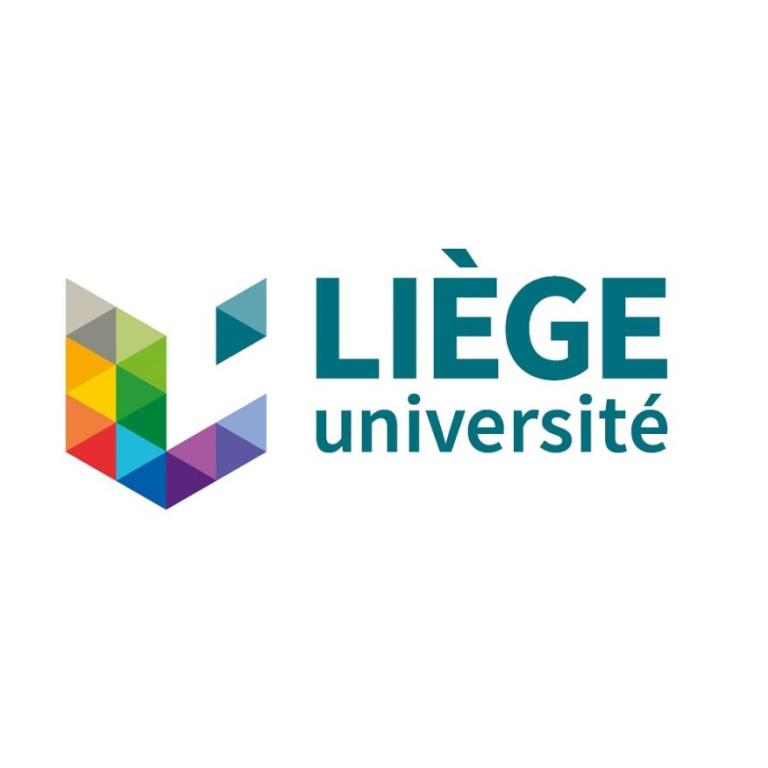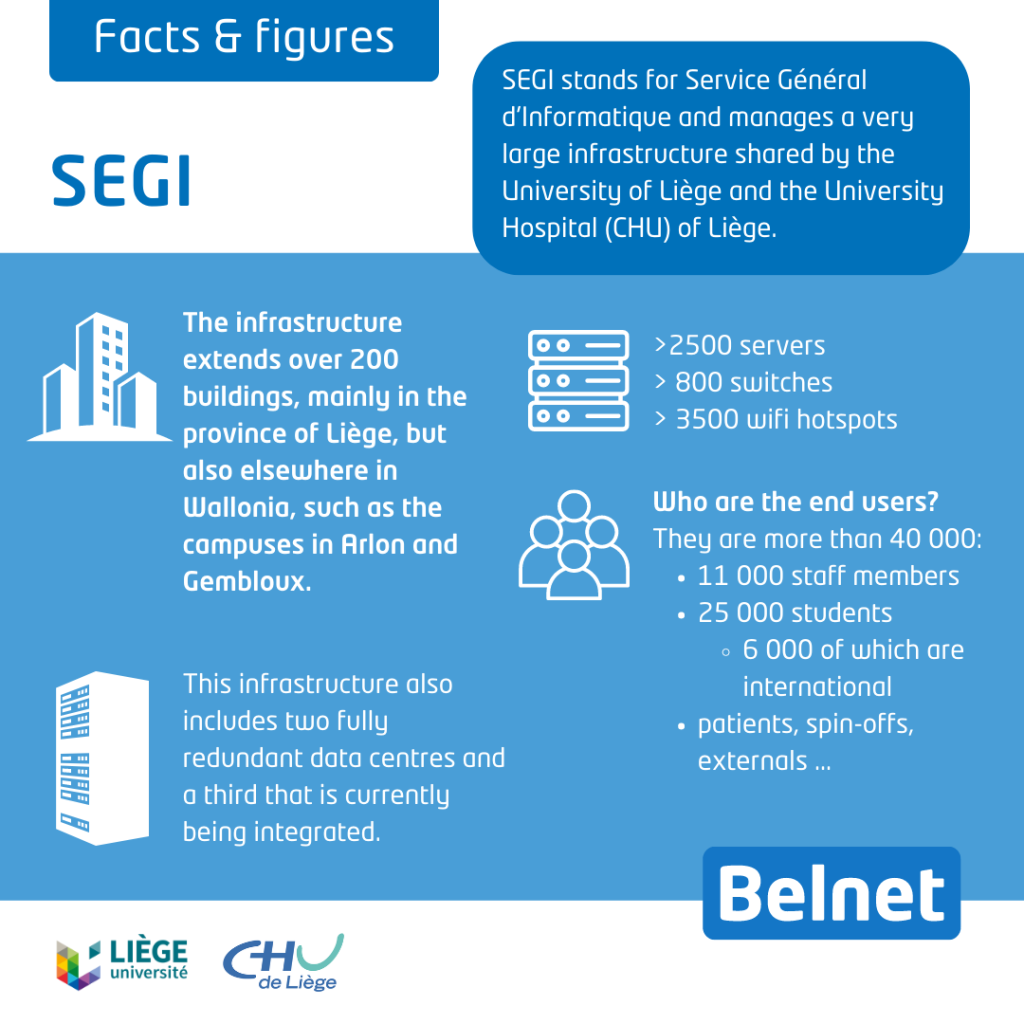
The general IT service at the University of Liège (ULiège) (Service Général d'Informatique de l'Université de Liège, SEGI) is responsible for the proper functioning of the IT infrastructure and systems for ULiège, as well as for the CHU (Centre hospitalier universitaire de Liège). Belnet spoke with Julien Del Peso, NOC/SOC manager at the SEGI, about the IT challenges at ULiège and the historical collaboration between Belnet and the university.
"With its 135 employees, the SEGI is a big team. This is by necessity, given the size of the infrastructure we manage and its 40,000 daily users spread over more than 150 buildings," says Julien Del Peso. "Our colleagues work across three poles. I myself work on the Operations pole, which looks after the IT infrastructure: network, telephony, systems, data centres, security, etc. The pole Development is responsible for the development and integration of institutional applications for our community, such as the student portal. Finally, we have a specific activity with the pole ULIS. This team has been dedicated to the development of human resources management software for the Belgian public sector for more than 20 years and manages the careers of over 200,000 Belgian civil servants."

Security as a priority
The increased complexity of IT infrastructure, as well as its indispensability to the day-to-day operations of the university and hospital, has redirected the SEGI's priority to security.
Julien Del Peso: "In the past, we were mainly familiar with the 'classical' challenges of the ICT sector: following technological developments, ensuring that our services meet our users' expectations, anticipating needs and responding to and dealing with incidents or unforeseen events. Of course, these challenges are still relevant, but not a day goes by when nothing about cybercrime appears in the media. Malicious actors are becoming increasingly professional, and IT has become so important that it is possible to cripple an entire institution by attacking its IT infrastructure. Add to that the potential reputational damage in the event of a cyber attack, and you understand that for us – just as for any company or organisation that depends largely on IT – security is the most important challenge of the moment."
Nonetheless, Julien Del Peso also sees some positive aspects to the increase in incidents. "The problem with security is that we don't realise how important it is until something goes wrong. However, I notice a growing awareness among the authorities, who are now really starting to invest and allowing us to impose stricter measures. At ULiège, security has long been one of our focal points. SEGI's operations and data centres have been ISO 9001 and ISO 27001 certified for nearly 10 years, which is unique in Belgium for a university. We also recently received extra funding to hire some additional security experts for our internal SOC, with the aim of reaching 4 full-time experts by 2024. The major challenge will be to attract these profiles, given the highly competitive job market."
He also sees a necessary effort in terms of raising awareness among end users. "We welcome thousands of new students every year, who connect their own devices to our network en masse, over which we have no control. They are often unaware of all the security risks involved. We have already deployed awareness campaigns to our end users in the past in collaboration with our communications department and the CCB, but additional efforts are necessary. Among other things, we are thinking about training sessions and using a tool that allows us to send out automated phishing tests."
Creating economies of scale
To best secure its DNS connections, the university uses Belnet Advanced DNS Security. ULiège also relies on Belnet for certificate management. Soon, the university will be migrating to the new Belnet Advanced DDoS Security service. "We want to guard as best we can against an interruption of our connectivity during crucial periods in the academic year. Belnet's new anti-DDoS solution is not only more robust, but also better suited to our needs."
Furthermore, ULiège is also looking to Belnet as a partner for other new security services. "The Belnet offering is already highly valuable, but a further expansion of the security portfolio would be a real added value for us. We are thinking especially, along with the other French-speaking universities, of services such as SOC/MDR, Threat Intelligence or cyber surveillance. These services are quite pricey on the market, so we are looking to Belnet to create economies of scale, as you have also done for Advanced DNS Security. An additional advantage of a contract that runs via Belnet is that the administrative workload is drastically reduced for us."
High-performance and reliable network
At the network level, Belnet links the various ULiège campuses (two in Liège, one in Arlon and one in Gembloux). In addition, the network is also crucial to the university's research activities. Julien Del Peso: "Thanks to the dedicated Belnet connections, our researchers have rapid access to the CÉCI's supercomputing infrastructure, which is spread across the five French-speaking universities. Those connections require a particularly high level of performance, and Belnet can provide that to us without any problems, and at an affordable price."

"Moreover, the Belnet network is extremely stable and reliable," Julien continued. "On the rare occasions when an incident does occur, we have always been able to count on professional support and smooth communication. The Belnet staff are very helpful and true experts in their field."
In terms of security, Julien also sees added value for the research and education networks. "A connection to Belnet provides us with a direct connection to a large number of external players in the R&E sector. Especially for research or medical data, it is a great advantage from a security point of view that our data traffic does not run over the networks of private operators."
The students at ULiège know Belnet primarily from eduroam. This allows them to safely and easily surf the Wi-Fi networks of other participating organisations anywhere. "Many of them go on Erasmus exchanges. We also welcome a great many students from France ourselves, for example. A service like eduroam is indispensable for the mobility of our students and researchers. We also notice this in the usage figures. Last month, for example, we recorded more than 10,000 unique eduroam authentications," explains Julien Del Peso.
Local storage
Many organisations have moved to the cloud en masse in recent years. At ULiège, however, this is different, and there is largely a historical reason for that. "The SEGI was established back in 1981. Since the beginning, we have been in the habit of developing and managing our services ourselves. For data storage, we rely almost exclusively on in-house servers. We have two in-house data centres and are currently equipping a third data centre for mass data storage. Because the university and CHU have merged their infrastructures, we can achieve some favourable economies of scale," Julien Del Peso explains.
During the Covid-19 crisis, the organisation switched to SaaS applications for the first time. "Working from home was a trigger for adopting Office 365, SharePoint and video conferencing tools. The digitalisation of numerous processes then gained momentum too."
Historical collaboration
The university has a special relationship with Belnet that can safely be called historical. Indeed, both organisations were among the pioneers of the Internet in Belgium in the 1980s and 1990s. Julien Del Peso continues: "In 1987, ULiège, along with several other universities and in collaboration with IBM, was connected to what would later become the Internet. In 1993, Belnet saw the light of day as a research programme within Belspo, initiating the massive interconnection of institutions nationwide. At the time, ULiège was one of the first institutions connected to Belnet."
"Belnet has always been the player of choice, offering us an infrastructure with very high performance, especially in terms of bandwidth, and using modern technologies that allow us to connect our various sites (e.g. our campuses in Arlon and Gembloux) in the best possible way."
The partnership between the university and Belnet also translates into the three Points of Presence (PoPs) that ULiège houses. Every year, Belnet holds a meeting with all the PoP managers. Julien Del Peso: "The PoP meeting is an ideal opportunity to exchange experiences with our colleagues, including on the Dutch-speaking side. We appreciate Belnet facilitating these meetings between the different communities."
The collaboration between ULiège and Belnet is as strong as ever after 30 years. "Over the years, Belnet has maintained its specificity and personal approach very well. Our teams find the exchange and communication with Belnet to be high-quality and valuable. In addition, it is a big plus that Belnet is a public service provider that continues to invest in its services and infrastructure for research and education. For all these reasons, Belnet is and will remain a preferred partner for us," concludes Julien Del Peso.